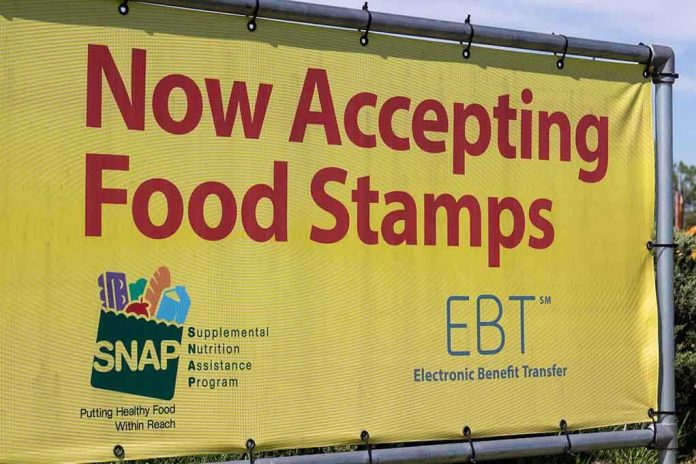
Six more states have been cleared by the Agriculture Secretary to ban soda and candy purchases with food stamps, marking a major policy shift in federal nutrition assistance and spotlighting the Trump administration’s push to overhaul SNAP for public health and fiscal responsibility.
Story Snapshot
- Six additional states—West Virginia, Florida, Colorado, Louisiana, Oklahoma, and Texas—have received federal waivers to exclude soda and candy from SNAP purchases, bringing the total to at least nine states.
- Changes are part of the Trump administration’s “Make America Healthy Again” initiative, led by Agriculture Secretary Brooke L. Rollins and supported by HHS Secretary Robert F. Kennedy Jr.
- Policy aims to confront chronic disease, reduce taxpayer spending on unhealthy foods, and reinforce citizenship eligibility for federal food aid.
- Implementation begins in 2026, with USDA encouraging more states to seek similar waivers.
Trump Administration and State Leaders Coordinate to Reform SNAP Eligibility
Federal and state officials are collaborating to redefine the scope of the Supplemental Nutrition Assistance Program (SNAP) by restricting purchases of sugary drinks and snacks. On August 4, 2025, Agriculture Secretary Brooke L. Rollins, accompanied by HHS Secretary Robert F. Kennedy Jr. and several governors, signed official waivers at the Great American Farmers Market, expanding the policy to six more states. These changes will take effect in 2026 and signal a shift toward nutrition-focused welfare policy, a reversal from prior administrations that repeatedly rejected similar state-led efforts. Secretary Rollins stated, “For years, SNAP has used taxpayer dollars to fund soda and candy—products that fuel America’s diabetes and chronic disease epidemics.”
The Trump administration’s stance is clear: SNAP should promote health, not subsidize products linked to chronic disease. The move follows President Trump’s February 2025 executive order demanding reforms to SNAP eligibility and benefit definitions. States are now empowered to act as “laboratories of democracy,” implementing restrictions tailored to local needs, provided they meet federal nutrition and citizenship guidelines. Governors such as Kim Reynolds of Iowa and Patrick Morrisey of West Virginia have expressed support, emphasizing the need to prioritize taxpayer interests and public health. The USDA, under Secretary Rollins, is actively inviting every state to submit waiver requests and join the push for healthier, more fiscally responsible SNAP standards.
Background: A Decades-Old Battle Over SNAP Purchases
SNAP, formerly known as food stamps, has historically allowed recipients to purchase most foods, with exceptions for alcohol, tobacco, and hot prepared items. Debates over restricting “junk food” from SNAP date back decades, pitting public health advocates against anti-hunger groups. Previous attempts by states like New York and Maine to ban sugary drinks with SNAP benefits were blocked by the USDA under past leadership. The new waivers represent the first large-scale, federally coordinated effort to reshape SNAP purchasing rules. Chronic health conditions such as obesity and diabetes have surged in low-income communities, fueling calls for reform. The Trump administration’s approach frames the issue as both a public health crisis and a matter of fiscal stewardship—prioritizing the responsible use of taxpayer dollars while seeking to reduce long-term government health care costs.
Some anti-hunger advocates have voiced concern that such restrictions could stigmatize recipients or limit already constrained food access. However, supporters—including many public health experts—argue the reforms align SNAP with its original nutritional intent and could yield substantial benefits for families and taxpayers alike. States now have federal backing to move beyond pilot programs and implement comprehensive bans on items like soda and candy, setting a new precedent for welfare reform.
Implementation Timeline and Political Drivers
The reform process began in February 2025, when President Trump issued executive orders mandating stricter SNAP eligibility and the exclusion of non-citizens from the program. Secretary Rollins quickly followed up with directives to enforce these requirements. On June 10, the USDA signed initial waivers with Arkansas, Idaho, Utah, Indiana, Iowa, and Nebraska. The August 4 expansion brings the total to at least nine states, with more expected to join as the USDA continues to solicit state participation. Governors of participating states have highlighted the reforms as a fulfillment of campaign promises to restore fiscal discipline, defend American values, and promote healthier communities. Secretary Kennedy echoed the administration’s message: “Taxpayer dollars should never bankroll products that fuel the chronic disease epidemic.”
The USDA’s Food and Nutrition Service is overseeing the rollout, working with state agencies and food retailers to update eligibility systems and prepare for a smooth transition. Retailers will need to adapt point-of-sale systems to comply with the new rules, while food manufacturers could see a decline in sales of restricted items. SNAP recipients in affected states will have a year to prepare for the changes before the new restrictions take effect in 2026.
Long-Term Implications and Expert Commentary
Supporters of the waivers argue that restricting SNAP purchases to healthier foods will yield long-term benefits, including reduced rates of obesity, diabetes, and other chronic conditions among low-income Americans. Public health experts generally endorse the policy, citing research linking sugary drinks and snacks to preventable disease and mounting health care costs. Critics, however, warn that limiting food choice could increase stigma and inadvertently reduce food security for vulnerable populations.
The broader economic and political impacts are likely to be significant. If successful, the reforms could lower government health care spending and set the stage for further changes in federal assistance programs. Food retailers and manufacturers will need to adapt to shifting demand, while states may leverage the new federal flexibility to experiment with additional SNAP reforms. The Trump administration’s willingness to grant waivers marks a decisive break with prior policies and underscores its commitment to upholding conservative values, defending taxpayer interests, and confronting what it sees as the harmful legacy of government overreach and permissiveness under previous leadership.
Sources:
USDA Press Release: Secretary Rollins Removes Unhealthy Food from SNAP (Aug 4, 2025)
USDAOC: President Trump Executive Orders on SNAP
Morning Ag Clips: Secretary Rollins Takes Action on SNAP
USDA Press Release: State Waivers to Make America Healthy Again (June 10, 2025)
Texas Department of Agriculture: Statement Praising Secretary Rollins



